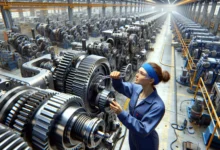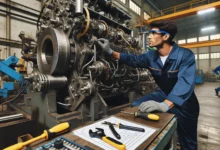Industrial Insurance Benefits
Advertisement
Introduction
Industrial insurance benefits play a crucial role in safeguarding the well-being of workers in various industries. This type of insurance provides financial protection for employees who are injured or disabled while performing their job duties. In addition to covering medical expenses and lost wages, industrial insurance benefits also offer vocational rehabilitation services to help employees return to work successfully.
Throughout this article, we will delve deeper into the importance of industrial insurance benefits, as well as its strengths, weaknesses, and frequently asked questions. By understanding the ins and outs of industrial insurance, both employers and employees can make informed decisions about their coverage options.
Industrial insurance benefits are designed to protect workers in high-risk industries, such as construction, manufacturing, and transportation. In the event of an accident or injury on the job, industrial insurance benefits can provide much-needed financial support to cover medical bills and other expenses.
Employers are required by law to provide industrial insurance coverage for their employees in most states. This helps ensure that workers are protected in case of workplace accidents, and also helps prevent costly lawsuits for employers.
Industrial insurance benefits are crucial for employees who work in physically demanding environments. Whether it’s a construction worker who falls from a scaffold or a factory worker who suffers a repetitive strain injury, industrial insurance benefits can offer peace of mind and financial security during difficult times.
Industrial insurance benefits can also help promote safety in the workplace by incentivizing employers to maintain a safe working environment. When employees know they are covered by insurance, they may be more likely to report safety hazards and take necessary precautions to prevent accidents.
Overall, industrial insurance benefits are a vital component of worker protection and well-being in today’s industrial landscape. By understanding the benefits and limitations of industrial insurance, both employers and employees can work together to create a safer and more secure workplace for all.
Strengths of Industrial Insurance Benefits
One of the key strengths of industrial insurance benefits is its ability to provide financial protection for injured employees. In the event of a workplace accident, industrial insurance benefits can cover medical expenses, lost wages, and rehabilitation services to help employees recover and return to work.
Another strength of industrial insurance benefits is its role in preventing costly lawsuits for employers. By providing insurance coverage for employees, employers can protect themselves from potential legal liabilities in case of workplace accidents or injuries.
Industrial insurance benefits also help promote safety in the workplace by creating a financial incentive for employers to maintain a safe working environment. When employees are covered by insurance, employers may be more motivated to invest in safety training, equipment, and protocols to prevent accidents and injuries.
Industrial insurance benefits can also help improve employee morale and satisfaction by providing peace of mind and financial security. Knowing that they are protected by insurance in case of a workplace injury can help employees feel more valued and secure in their jobs.
Furthermore, industrial insurance benefits can contribute to faster recovery and return to work for injured employees. By providing access to medical care and rehabilitation services, industrial insurance benefits can help employees recover more quickly and resume their job duties.
These strengths of industrial insurance benefits highlight its importance in protecting workers, promoting safety, and fostering a positive work environment in industrial settings. By leveraging these benefits, both employers and employees can create a more resilient and sustainable workplace.
However, industrial insurance benefits also have some limitations and weaknesses that need to be considered. It’s essential to weigh these drawbacks against the benefits to make informed decisions about insurance coverage.
Weaknesses of Industrial Insurance Benefits
One of the weaknesses of industrial insurance benefits is the potential for increased premiums for employers. When employees file claims for workplace injuries, it can lead to higher insurance premiums for employers, which can be a financial burden for small businesses in particular.
Another weakness of industrial insurance benefits is the complexity of the claims process. Filing for insurance coverage can be time-consuming and require extensive documentation, which can be challenging for employees who are already dealing with the stress of a workplace injury.
Industrial insurance benefits also have limitations in terms of coverage for certain types of injuries or illnesses. Some policies may exclude coverage for pre-existing conditions or non-work-related injuries, which can leave employees vulnerable in specific situations.
In addition, the waiting period for industrial insurance benefits can be a drawback for employees who need immediate financial assistance after a workplace injury. Depending on the policy, there may be delays in processing claims and disbursing benefits, which can create hardship for injured workers.
Moreover, industrial insurance benefits may not fully compensate for the long-term impact of a workplace injury on an employee’s physical and mental well-being. While insurance can cover medical expenses and lost wages, it may not address the emotional trauma, pain, and suffering that an employee experiences after an accident.
These weaknesses of industrial insurance benefits underscore the need for careful evaluation and consideration when selecting insurance coverage. Employers and employees should be aware of the limitations of industrial insurance to effectively manage risks and ensure adequate protection in the event of workplace accidents.
Despite these weaknesses, industrial insurance benefits continue to play a vital role in protecting the health, safety, and financial security of workers in industrial settings. By understanding the strengths and weaknesses of industrial insurance, both employers and employees can make informed decisions about their coverage options and safeguard their well-being.
Industrial Insurance Benefits Overview
| Benefit | Description |
|---|---|
| Medical Coverage | Provides coverage for medical expenses related to workplace injuries. |
| Lost Wages | Compensates employees for lost wages due to injuries that prevent them from working. |
| Rehabilitation Services | Offers vocational rehabilitation services to help employees return to work successfully. |
| Legal Protection | Protects employers from potential lawsuits related to workplace injuries. |
| Safety Incentives | Promotes safety in the workplace by creating financial incentives for employers. |
| Employee Morale | Improves employee morale and satisfaction by providing financial security and peace of mind. |
Frequently Asked Questions about Industrial Insurance Benefits
1. What is industrial insurance?
Industrial insurance is a type of coverage that provides financial protection for employees who are injured or disabled while performing their job duties in industrial settings.
2. Who is eligible for industrial insurance benefits?
Eligibility for industrial insurance benefits typically depends on the type of work performed and the regulations in the state where the employee is based.
3. How are industrial insurance premiums calculated?
Industrial insurance premiums are usually calculated based on factors such as the industry, the size of the workforce, and the company’s safety record.
4. What types of injuries are covered by industrial insurance benefits?
Industrial insurance benefits generally cover injuries sustained in the workplace, such as falls, burns, strains, and fractures.
5. Can employees choose their own healthcare providers under industrial insurance?
Some industrial insurance policies allow employees to select their own healthcare providers, while others have a designated network of providers for medical treatment.
6. Are mental health conditions covered by industrial insurance benefits?
Mental health conditions related to workplace stress or trauma may be covered under industrial insurance benefits, depending on the policy terms and conditions.
7. How can employers promote safety in the workplace through industrial insurance benefits?
Employers can promote safety by providing training, safety equipment, and incentives for employees to report hazards and follow safety protocols effectively.
Conclusion
Industrial insurance benefits are a crucial aspect of protecting workers and promoting safety in industrial settings. By understanding the strengths and weaknesses of industrial insurance, both employers and employees can make informed decisions about their coverage options.
It is essential to weigh the benefits and limitations of industrial insurance benefits to ensure adequate protection for employees in the event of workplace accidents or injuries. By prioritizing safety, well-being, and financial security, industrial insurance benefits can contribute to a more resilient and sustainable industrial workforce.
Whether you are an employer looking to provide comprehensive insurance coverage for your employees or an employee seeking financial protection in case of a workplace injury, industrial insurance benefits offer a range of advantages and considerations to keep in mind.
Take the time to explore your options, ask questions, and evaluate your needs to determine the best industrial insurance coverage for your situation. By investing in the well-being and safety of your workforce, you can create a more secure and productive industrial environment for all.
Remember that industrial insurance benefits are a valuable tool for protecting your long-term health, safety, and financial security in the ever-evolving industrial landscape. By staying informed and proactive about your insurance coverage, you can navigate the challenges of the workplace with confidence and peace of mind.
Don’t hesitate to reach out to insurance professionals, industry experts, and regulatory authorities for guidance and support in understanding and utilizing industrial insurance benefits effectively. With the right information and resources, you can make informed decisions that benefit both you and your colleagues in the industrial sector.
Disclaimer
The information provided in this article is for informational purposes only and should not be construed as legal, financial, or medical advice. Industrial insurance benefits vary by state and insurer, so it is essential to consult with professional advisors and experts to obtain accurate and timely information related to your specific situation and needs.
Always review policy terms and conditions, exclusions, and limitations before purchasing industrial insurance coverage. Be sure to ask questions, seek clarification, and compare options to make well-informed decisions about your insurance needs.
It is crucial to keep in mind that industrial insurance benefits are subject to change based on regulatory requirements, industry trends, and individual circumstances. Stay proactive, informed, and vigilant about your insurance coverage to protect your well-being and financial security in the workplace.









